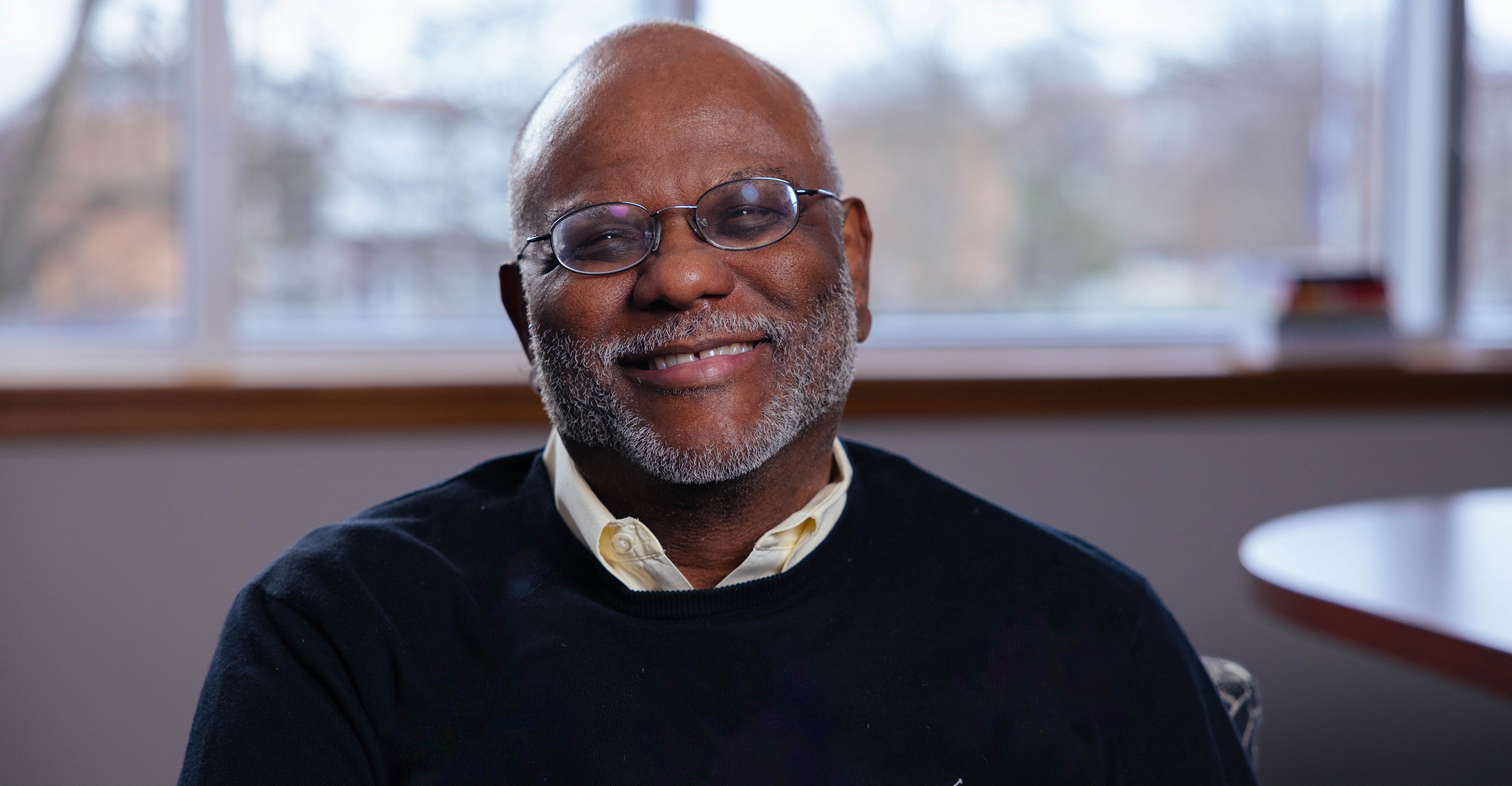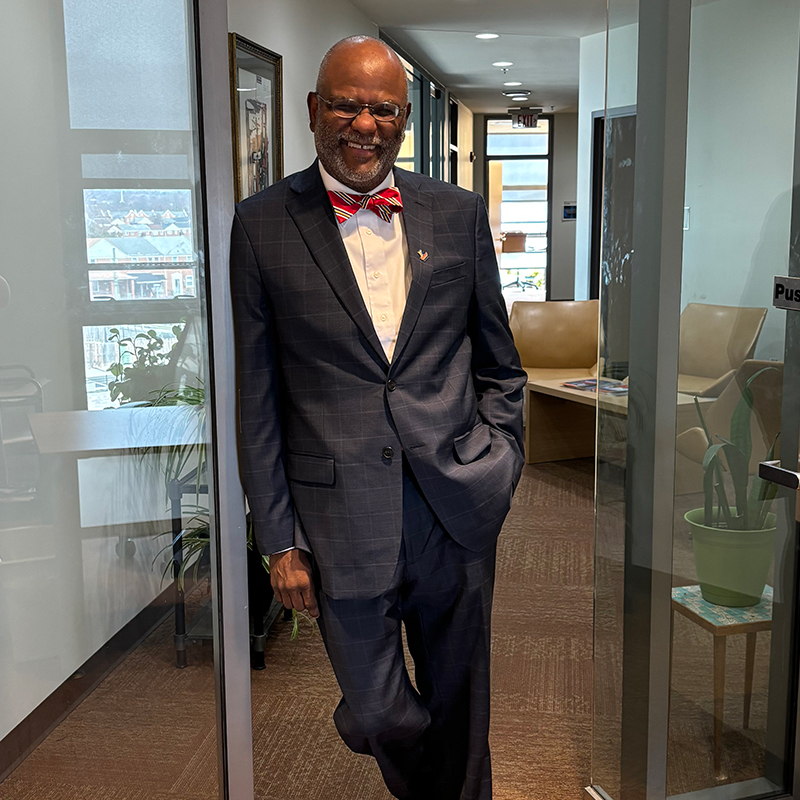
Alumni Q&A: Dr. Royce Burnett
Thursday, June 6, 2024
Media Contact: Hallie Hart | Communications Coordinator | 405-744-1050 | hallie.hart@okstate.edu
Dr. Royce Burnett stepped onto Oklahoma State University’s campus as an accomplished businessman with 17 years of accounting experience.
The Sam Houston State University graduate had not only worked for two Big 4 firms and two Fortune 500 companies, but also started an accounting practice, reaching what would have been the pinnacle of success for many young professionals in the 1990s. Instead, Burnett was nowhere close to his magnum opus.
OSU’s Spears School of Business, then known as the College of Business Administration, introduced him to a new, gratifying career path at age 37. His enduring love for academic leadership has guided him to his new role starting July 1 as dean of the Earl G. Graves School of Business and Management at Morgan State University, a historically Black university in Baltimore that is rapidly growing as a research hub. He previously held positions at Old Dominion University, the University of Miami (Fla.) and Southern Illinois University.
Burnett taught business courses and won awards while obtaining his doctorate in accounting from OSU in 2003. He credits his OSU professors for inspiring him to translate his real-world skills to university settings.
“Oklahoma State was committed,” Burnett said. “And Oklahoma State made sure that they made a difference in the world.”
Burnett talked to Spears about his OSU journey, achievements and connection to the “Power of Personal” motto.

Q: After years of working for major accounting firms, what inspired you to come back to academia and go to OSU for your Ph.D.?
A: After having worked for 17 years, I started to look around for Ph.D. programs.
The PhD Project is a program that really, in the early ’90s, was focused on populating more African Americans into the roles of business academia. They reached out to me, and I just kept ignoring them. Then I was like, “OK, well, let me see what this is all about,” and when I got more exposure to the project, I was like, "Well, this is really interesting." Then I started the sojourn of looking for Ph.D. programs, and a really good friend of mine, Dr. Margaret White, was at Oklahoma State. She was in the management department, and she came to me and said, “Royce, why don’t you look at Oklahoma State?” I was like, “Where is that?” and she said, “It’s in Stillwater.”
When I got there, it was just wonderful. The people were nice. They were very, very committed to my success, and when I was interviewing with them, they were very gracious to me. They wanted me. They had a very good track record of not only attracting minorities, but matriculating them, and that’s a big thing. A lot of schools just left you on the vine — they got you in, and they bubbled you in terms of numbers, and that was it — but Oklahoma State didn’t do that. I took all of these very, very difficult courses that prepared me to be able to be successful in my academic pursuits, so much so that I won the Outstanding Dissertation Award for Social Sciences, and an OSU business student had never won that before. My dissertation was really an early entrée into environmentalism.
Q: Through that dissertation, what did you learn about the connections between environmentalism and economics?
A: The key thing that I took away from it was at the time, there was a myopic view that it was a zero-sum game: either you pursued environmental protection, or you pursued economic benefit. What my dissertation really explained was that you can pursue both of them simultaneously, and at the end of the day, you will receive positive benefits from each one of those.
Q: Did any certain class or professor particularly influence your career path?
A: Dr. Don Hansen and Dr. Charlotte Wright. They really, really protected me and guided me and gave me some really, really good thought processes.
The experience at Oklahoma State taught me what academia was going to be all about, because not only did they teach you the business of getting a Ph.D. but they also were very focused on making you have some kind of understanding about what the academic profession was all about and how you handled yourself and how you really allowed yourself to go from a professional to an academic. Oklahoma State did a really good job of attracting, retaining, training and placing their Ph.D. students.
Q: With your personal story, what does it mean to you to now step into this role guiding young Black entrepreneurs at Morgan State?
A: What happens is that you become a role model because people look at what you have done. They look at the obstacles that are in place and they look at still how successful you are, but how you still are willing to give back and to recognize that. For me to be able to go to Morgan State and to be able to help young students, it’s a godsend.
Q: Today, Spears School of Business has the motto, the “Power of Personal.” As someone who has emphasized the human aspect of business and accounting throughout your career, what does that mean to you?
A: I wanted to make a difference, so this motto for Spears is exactly what I articulate all the time. It is personal, and the way that you make your students successful is that you invest in them from a personal perspective. Accounting has been a personal thing for me. When I taught, I looked at students not just as students in my class but individuals who may not know accounting, but they want to be something.
Q: What did you teach at OSU?
A: I taught the principles of accounting courses, which would be financial and managerial, and then I taught the advanced cost class.
Q: What were your strategies for making those topics engaging for students in the classroom?
A: I remember Dr. Hansen saying, “Royce, you want to use the book as a basis, but at the end of the day, you want to use the book as a foundation to really explain to students what this is all about.” When students would ask me questions, I would really go behind the question in my mind’s eye. I could scan my class, and I looked for students who were struggling because oftentimes, if they don’t know something, they may not be engaging; they may not ask; they may be too uncomfortable. But at the end of the day, you’ve got to reach those students — not just the ones who are participating, but also the ones who are being passive. So, I made it an active effort to engage with students.
Q: Is there anything else you would like readers to know?
A: Thank you for OSU as a whole and the Spears School of Business as a whole. Thank you for believing in me. Thank you for training me. Thank you for supporting me, and thank you for always being a part of my life. Oklahoma State did so much for me during the time that I was there. I talked about three persons individually (Hansen, White and Wright) because they probably had the most seminal effect on me, but that doesn’t mean that the other individuals I took classes from or worked with or interacted with were not just as important. I want to thank them. It’s not about me. It is about what they did for me so that I could be who I am.
